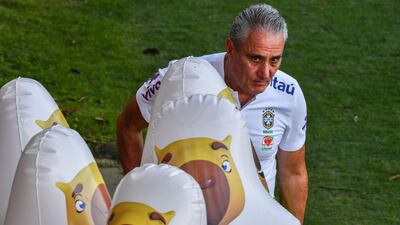Sunday marks five years since the day they do not like to remember; the day the Brazilian national team was robbed of its fear factor with all the ease of snatching a necklace from the neck of a gringo on Copacabana Beach. Sete-um it is referred to around these parts: 7-1. Germany made up for their semi-final misdemeanour five days later by ending Argentina's plans to lift the World Cup on enemy territory, but Brazil have had to wait patiently for their chance of redemption.
Today is that day, an open-goal opportunity to throw a considerable amount of fresh soil on those memories buried deep in the rainforest of Brazilian consciousness. As hosts once more, Brazil will meet an unfancied Peru this evening in the final of the 2019 Copa America — the same Peru they defeated 5-0 during the group stage. While continental success is incomparable to a World Cup, it would mark Brazil's first international title since 2007 and timely recognition of the good work of coach Tite, who has been jeered at four of his side's five matches.
As well as the humiliating scoreline, the sete-um is remembered for the Brazil team's maudlin tributes to the injured Neymar. At the time, it was suggested they were mourning the absence of the wrong player and five years later that hypothesis only appears more valid. Neymar is mercurial, but Thiago Silva, suspended for the Germany match, was the rock without whom his country's defence fell to pieces like a house built on sand.
At the Copa America, Silva, Marquinhos, Dani Alves and Filipe Luis make up a back four that is yet to concede a goal. Silva says the strength of his country’s defence comes from the players in front of him, yet it is for reasoning such as this that the unique player behind him — goalkeeper Alisson — is unlikely to win the tangible recognition that some quarters suggest he deserves.
Even Alisson plays down his contribution.
"I just limit myself to doing my job," he said after shutting out Argentina on Tuesday to extend his run of not conceding to 846 minutes spread over nine games. In the past 12 months, the Liverpool stopper has won Golden Gloves — the award for most clean sheets — in the Premier League, Champions League and now, with the final to spare, the Copa America. Asked if he could win the Ballon d'Or, he laughed before replying: "There are a lot of top players aspiring for that prize — I'm just a goalkeeper."
Not since Lev Yashin in 1963 has the last line of defence won the prize for best player in the world. Virgil van Dijk, the Liverpool centre-back, won the Premier League's Player of the Year for 2018/19 and there is a feeling Alisson might not even be selected in the top three when Ballon d'Or voting takes place later this year.

Yet it is impossible to play down the 26-year-old’s importance to this Brazil side. Since the start of 2017, Alisson has started 26 matches for his country and conceded just six goals — a ratio of one every 383 minutes. In the eight-and-a-half games he was not involved, Brazil conceded three, or once every 255 minutes. It hardly even needs to be pointed out that conceding six in two and a half years is less than Brazil gave up in 90 minutes in a match five years ago.
Tite’s blueprint for Brazil 2.0 is built on a strong and organised defensive structure, but it is not a style that sits comfortably with a set of fans raised on Pele and Garrincha, Zico and Socrates, Ronaldinho and “Ronaldo Fenomeno”. Yet this is a team that scored eight in three group games, had 26 shots in the stalemate with Paraguay, and produced a clinical 2-0 win over Argentina in the last-four.
It would suggest the manager has found a winning balance even without the one truly world-class Brazilian able to unlock a deep-lying defence. Neymar was not the most important absentee at the Mineirao in 2014, but he might be at the Maracana against a Peru side unlikely to take the game to their superior hosts.
There is a sense that only a repeat of the 5-0 group-phase win would satisfy, because while Brazilians are ravenous for success once more, they have little appetite for winning ugly, especially against a side they believe they should beat comfortably. Should his team fail to score, Tite’s position will be questioned. Yet even if they win, such are the demands of a long-spoiled public, he could well still be jeered — which, fittingly, would be a difficult action to defend.

